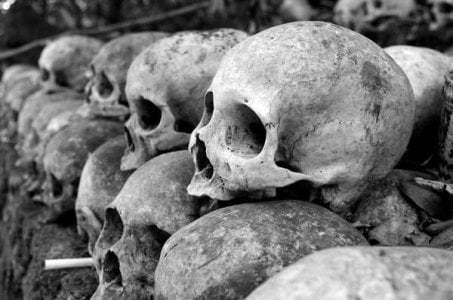What happens after we die? The world’s smartest man’s theory will leave you questioning everything
By
Maan
- Replies 19
The question of what happens after we die has intrigued humanity for centuries, sparking countless theories and debates.
But what if the answer lies in an unexpected place—one that challenges our most basic understanding of life and existence?
A man with one of the highest IQs in history has shared his startling theory, offering a perspective that could change everything we thought we knew about the afterlife.
When it comes to life's big mysteries, the question 'What happens after we die?' stands at the top.
And while many have pondered the answer, Chris Langan, a man with one of the highest IQs in history, claims to have figured it out.
At 72, Langan, an American horse rancher, is said to have an IQ between 190 and 210—significantly higher than Albert Einstein’s, by 30 to 50 points.
Langan's hypothesis, known as the Cognitive-Theoretic Model of the Universe (CTMU), aims to bridge the gap between mind and reality. He suggests that death isn't the end, but rather a transition from one form of being to another within the computational structure of reality.
In his view, when we die, our consciousness, or 'soul,' shifts to another dimension or plane of existence, a space beyond our reach while alive.
Though it remains unclear what this new dimension looks like, Langan rejects traditional concepts of heaven and hell, believing that his theory proposes a much deeper, more complex transition.
Langan explained his theory of death during an appearance on Theories of Everything with Curt Jaimungal in May.
He described death as 'the termination of your relationship with your particular physical body that you have at this present time. When you are retracted from this reality, you go back up toward the origin of reality.'
For Langan, death doesn’t mean non-existence. Instead, it's a process of moving into a different state, where you might even be given a new body to continue existing.
He said: 'You can be provided with a substitute body, another kind of terminal body that allows you to keep on existing.'
This suggests that death, according to Langan, doesn't signal an end. After transitioning to this new plane, the 'soul' may not even remember its past life, as 'nothing goes out of existence in the math.'
Langan continued, 'Your memories can always be pulled back out, but there’s no reason to do that usually, OK? Why cling to memories of a world in which you are no longer instantiated?'
As for the immediate experience of death, Langan proposed that it could resemble a state of meditation, 'seeing everything change.' He explained, 'Now you’re basically meditating, seeing everything change. However, you exist that way right now.'
In his view, life isn’t just a linear sequence of events. Instead, 'all of your lifetimes, if you were to be reincarnated again and again and again, all of those reincarnations are meta-simultaneous.'
For Langan, the afterlife is a profound shift in being, unlike any concept we may know on Earth. It’s a departure from the physical world, where 'soul' or consciousness transcends the boundaries of self.
Langan’s theory also includes his view on god. He does not see god as a deity in the heavens but as an identity of certain properties that can be observed around us.
His CTMU, which he claims is a true Theory of Everything relies on three main assumptions. First, reality is made of information in the form of language.
The second assumption posits that reality is 'transtemporal,' meaning timelines can influence each other. And third, our self-simulated reality has a 'substrate' of information—a 'panconsciousness' emerging from the creator or simulator itself.
While many may find his ideas controversial, Langan’s unique perspective offers a new lens through which to contemplate life and death.

Could our consciousness really transcend into another dimension? Share your thoughts in the comments below.
But what if the answer lies in an unexpected place—one that challenges our most basic understanding of life and existence?
A man with one of the highest IQs in history has shared his startling theory, offering a perspective that could change everything we thought we knew about the afterlife.
When it comes to life's big mysteries, the question 'What happens after we die?' stands at the top.
And while many have pondered the answer, Chris Langan, a man with one of the highest IQs in history, claims to have figured it out.
At 72, Langan, an American horse rancher, is said to have an IQ between 190 and 210—significantly higher than Albert Einstein’s, by 30 to 50 points.
Langan's hypothesis, known as the Cognitive-Theoretic Model of the Universe (CTMU), aims to bridge the gap between mind and reality. He suggests that death isn't the end, but rather a transition from one form of being to another within the computational structure of reality.
In his view, when we die, our consciousness, or 'soul,' shifts to another dimension or plane of existence, a space beyond our reach while alive.
Though it remains unclear what this new dimension looks like, Langan rejects traditional concepts of heaven and hell, believing that his theory proposes a much deeper, more complex transition.
Langan explained his theory of death during an appearance on Theories of Everything with Curt Jaimungal in May.
He described death as 'the termination of your relationship with your particular physical body that you have at this present time. When you are retracted from this reality, you go back up toward the origin of reality.'
For Langan, death doesn’t mean non-existence. Instead, it's a process of moving into a different state, where you might even be given a new body to continue existing.
He said: 'You can be provided with a substitute body, another kind of terminal body that allows you to keep on existing.'
This suggests that death, according to Langan, doesn't signal an end. After transitioning to this new plane, the 'soul' may not even remember its past life, as 'nothing goes out of existence in the math.'
Langan continued, 'Your memories can always be pulled back out, but there’s no reason to do that usually, OK? Why cling to memories of a world in which you are no longer instantiated?'
As for the immediate experience of death, Langan proposed that it could resemble a state of meditation, 'seeing everything change.' He explained, 'Now you’re basically meditating, seeing everything change. However, you exist that way right now.'
In his view, life isn’t just a linear sequence of events. Instead, 'all of your lifetimes, if you were to be reincarnated again and again and again, all of those reincarnations are meta-simultaneous.'
For Langan, the afterlife is a profound shift in being, unlike any concept we may know on Earth. It’s a departure from the physical world, where 'soul' or consciousness transcends the boundaries of self.
Langan’s theory also includes his view on god. He does not see god as a deity in the heavens but as an identity of certain properties that can be observed around us.
His CTMU, which he claims is a true Theory of Everything relies on three main assumptions. First, reality is made of information in the form of language.
The second assumption posits that reality is 'transtemporal,' meaning timelines can influence each other. And third, our self-simulated reality has a 'substrate' of information—a 'panconsciousness' emerging from the creator or simulator itself.
While many may find his ideas controversial, Langan’s unique perspective offers a new lens through which to contemplate life and death.
Key Takeaways
- Chris Langan, a man with an IQ between 190 and 210, has developed a theory called the Cognitive-Theoretic Model of the Universe (CTMU), which suggests that death is a transition to a new form of existence.
- Langan believes that after death, consciousness or the 'soul' moves to another dimension or plane of reality beyond our access while alive, rejecting traditional views of heaven and hell.
- According to Langan, death doesn't mean ceasing to exist but rather a shift to a different state, potentially with a new body, and memory of past lives may not carry over.
- His theory posits that all lifetimes, even reincarnations, could exist simultaneously in a 'non-terminal' domain, and the afterlife involves a profound shift in being beyond the physical or mental self.
Could our consciousness really transcend into another dimension? Share your thoughts in the comments below.









